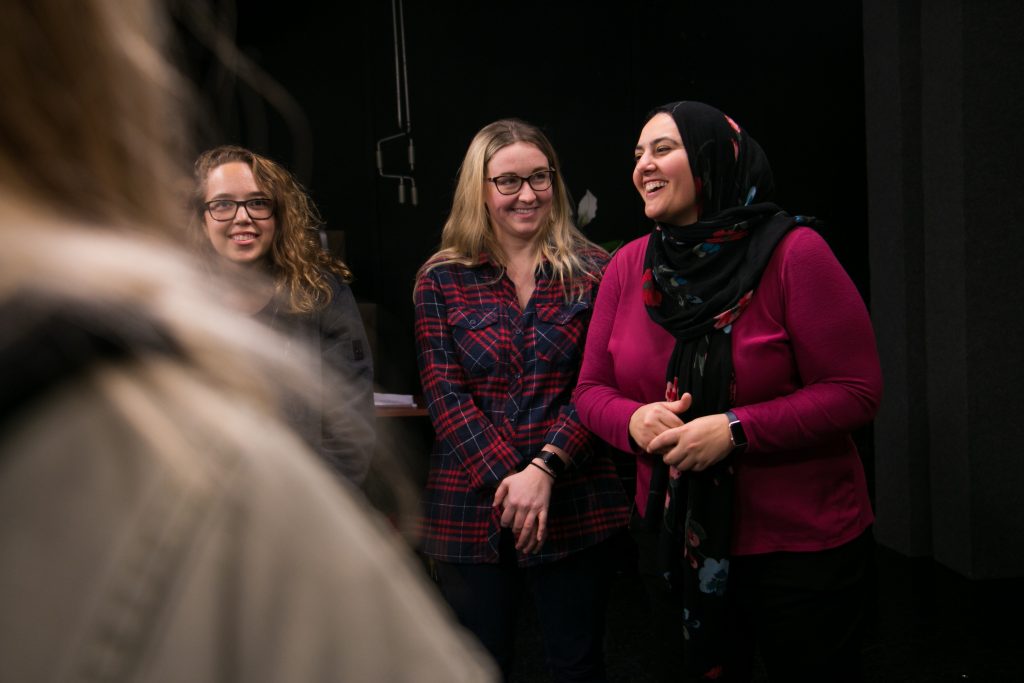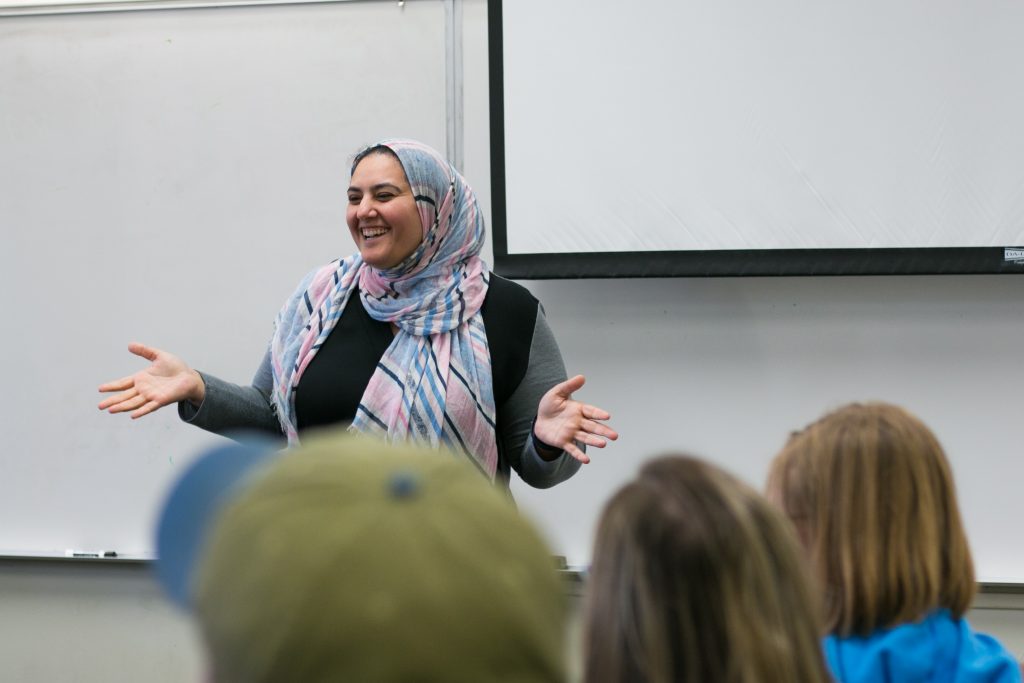Iman Zawahry Discusses Filmmaking, Mentoring Young Muslim Artists, and Comedy for Social Change
CJC Media Production, Management, and Technology Lecturer Iman Zawahry was interviewed on March 3, 2021 about being a Muslim filmmaker in the U.S., the challenges of affecting social change with comedy, and mentoring aspiring artists.
Below the video is an edited transcript of that interview.
How did you develop your love of filmmaking?
Zawahry: I was raised in Panama City, Florida, which is a very small town in the panhandle and there was not much to do. So me and my friends would watch television shows and movies, all day and night, and that’s all that we did. And we started creating our own commercials and videos. I was Arsenio Hall, and it was called the Iman Hall Show, where I was a talk show host. We created these stories and we did spoofs. And so that’s really where my love of telling stories and film came through and particularly through comedy.
Using comedy to tell stories and to deal with the “trauma” that I grew up with in the South was the best way for me to dismantle what was happening in our lives and to educate myself and others through a way that really connects and relates to people. My favorite quote of all time is, “Laughter is the shortest distance between two people.” And that’s what I live my life by. If we can laugh together, we can communicate, we can connect, we can create peace and we can create understanding.
And so comedy really got built from my childhood in Panama City, and with my five core friends. We were five brown Muslim women in the city and we were the daughters of physicians. And so we did come from a privileged affluent life, but it was really juxtaposed by this minority status. And people never saw us as anything but brown or Muslim, like worshiping the moon God or whatnot.
I look back at it and I look at my friends and see how we used comedy to get through it.
Have you always worn a hijab?
Zawahry: No, I didn’t actually. I started wearing hijab my sophomore year of college at the University of Florida. And the reason I started wearing hijab was because I have always been an advocate for Muslims and I always felt like I had this responsibility because we’re such a new, small community and we’re all first generation immigrants. I always felt the need to be like, “I am American and I am Muslim and that’s okay.” I worked so hard to dispel stereotypes. And so my entire childhood, even in high school, before I wore a scarf, everybody knew us as Muslims, no matter what, because we were all seen as Muslims. We weren’t seen as Arabs, we were seen as Muslims.
So when I came to college, I said “You know what, if I’m going to talk the talk, I want to walk the walk and I’m going to visibly be a Muslim woman so that I can dispel more stereotypes.” I put this huge burden on myself. Of course, there’s the spirituality aspect. But really a large driving force in me putting a scarf on was to dispel stereotypes. I’m a jovial, comedic, lighthearted person, and this is how Muslim people are.
I started to wear the scarf my sophomore year of college and then September 11th happened the next year. I was president of the Muslim Student Association at UF. And I came back on the defensive agaom, having to show that we’re great people, we’re not terrorists. Getting into film school provided me with an avenue to try to educate others and to show people that we’re human like everyone else.

What were some of the challenges and obstacles you faced as a Muslim woman in the filmmaking industry?
Zawahry: Actually in filmmaking it wasn’t so much about challenges of being a Muslim woman, because I was one of two. Everyone wanted to hear our story. So the amount of love that I received was enormous. I was telling stories of Muslim women that have never even been seen before. Even the other filmmaker, Lena Kahn, wasn’t telling a Muslim woman’s story. So I had women with their scarves on just wanting to be a standup comedian or wanting to be a detective, but then tripping up on themselves all the time.
I remember screening my film in Sarasota, which has a large older Jewish community. And this woman stood up after she screened one of my shorts and started clapping and then tears were coming down her eyes and she said, “You are the beacon of peace.”
I thought that this was so uncomfortable, but we are getting somewhere. We’re working to educate people and they’re seeing something that they’d never seen before. When they saw someone that looks like me, they thought oppressed, docile, timid, all that stuff. So you don’t see Iman, who is the complete opposite to the characters I portray on screen. I was really embraced as a Muslim woman in the film industry, and that’s why I got a student Emmy award (for her film “Tough Crowd”) and I was able to pitch a sitcom to NBC and all of that stuff.
My actual struggle, particularly now, is not that I’m Muslim and a woman, it’s that I make comedies and comedies are not taken in, especially in the independent film world, as well as dramas are. I still believe, especially in these larger festivals, they want to see really gritty dramas of huge struggles or Muslim women being stoned or this and that. So this concept that I’m addressing political issues and social issues with lightheartedness, has been my biggest struggle as a Muslim filmmaker
Have you seen progress in the film world embracing Muslim filmmakers and performers?
Zawahry: Yes, definitely. I started my journey in 2006 when I went to FSU (Florida State University) film school and the same things were coming out about the stories and the journeys of Muslims. They were the terrorists, terrorists’ girlfriends, the bad guys, angry people. And I was slowly trying to dispel this. In 2009, when I pitched a show to NBC, the executive told me, “We need your voice.” But still the same thing was happening, the story wasn’t being told, the American audience wasn’t ready yet.
But then in 2016, when Donald Trump was elected and instituted a Muslim ban, a bunch of executives in New York got together and said “We have to create more opportunities for Muslim stories.” And that’s when the boom began. The hijab was the new black and all of these things were opening up. The only issue was it was opening up, but it wasn’t uplifting the ones that were telling the story. And that was a little bit more of challenge in the beginning of 2016.
We had Ramy now, the first American Muslim show ever made and I don’t think it would have happened before 2016. We’ve had multiple positive characters in television and films after that. We were seeing a lot of shows with Muslim men, like Hasan Minhaj and Ramy Youseff, but we weren’t seeing any Muslim women, and so that’s still the fight that we’re trying to get through. (See Zawahry’s opinion piece
“Is Hollywood Ready for Muslim Women Leads?” on The Wrap.)

How are you helping other young Muslim artists develop their craft?
Zawahry: So this is actually what I call my legacy and it’s a part of who I am because when I was coming up, I was the only one and I didn’t have a mentor and I didn’t have anybody I could look up to. So I put it on myself to mentor others and to support others. It’s very strong in our culture that you have to be a doctor to survive in America, or a lawyer. The arts are not supported within our culture, so I have a lot of things where I’m fighting aunties and uncles to let their kids be filmmakers.
In 2009, I received a grant from the Islamic Scholarship Fund to make my thesis film. They were the first grant to fund Muslims in non-science majors. I was their first film recipient. And they asked me about what they can do to help Muslim filmmakers. I was working on my own film then and needed funds and there was no one to support me. So I suggested that they create a film grant. And in 2014, I co-created, and am the director, of the first American Muslim film grant and the only Muslim film grant that funds and supports and mentors Muslim filmmakers. And it’s crazy because in 2014 we had 40 applications. And now, in only our eighth year, we have hundreds of applications and, more importantly, higher-quality applications.
So mentoring, finding filmmakers, and working on creating different labs for filmmakers. That’s really the biggest part, besides being a filmmaker, of what I do: cultivating a stronger Muslim filmmaker network in our country. And we are especially focused on the identity of being American Muslims, because there is a perception that if you’re Muslim, that equals foreign, and that’s not the case. We are American, we are Muslim and they’re not mutually exclusive.
What made you decide to get into teaching?
Zawahry: When I went to FSU, I found out that having an MFA (Master of Fine Arts) was a terminal degree and that I could teach. My goal had always been to teach and to make my films. It was never just one or the other. And I think it goes back to my concept of mentoring and educating others to tell stories because I didn’t have that myself. So that was something that was really big and important for me.
I got the opportunity after film school. I had come back to Gainesville, where my husband’s family is from. I met [Telecommunication Lecturer] Houston Wells when I was producing a feature film with one of our alumni, Adam Bowers, and Oscar-winning producer Adele Romanski, who produced “Moonlight.” And when I met Houston, I became his adjunct and that’s where the journey started. I talk about this all the time. Teaching is the most important and fulfilling aspect of the many jobs that I have, and it’s something that keeps me going and that keeps me creative and keeps me learning.
What was your goal in creating the Islam, Media and Pop Culture class? What were you hoping to accomplish with that?
Zawahry: With the Islam, Media and Pop Culture class, I really wanted to create a way for students to learn how to tell a story that’s not their own. And then also tell the historical perspective of how our country has portrayed and told stories about Muslims and other minorities, so that we can be informed on how to really tell those stories. You can’t connect with the culture unless you’re seeing or practicing in that environment. So I have the students create their own films about Muslims. One of the favorite ones is like a music video. They have to create a rap music video about something about Islam, and they’re so hilarious.
And another thing I do, which does make students uncomfortable, is have them create a PSA about Muslims. I ask them to tell me something about Muslims in their PSA. They feel uncomfortable because they don’t want to be disrespectful. But this is what we’re learning. We’re trying to see what the line is and if we are going to cross it or not. I have them meeting Muslims throughout. They do a photo assignment and they also do a news article where they talk to Muslims and tell their stories. So they’re interacting with people that they usually wouldn’t interact with. And lastly, and most importantly, every week or so I bring in a professional from the industry. So a writer from Hollywood, a reporter from NPR, an actor in Hollywood. And they talk to them and they get their experiences on what it is to be in their craft in general, and as a Muslim in that craft.
There are so many aspects of what I’m trying to teach them. It’s not just about being Muslim, but in general interacting with people who have a different ethnicity or culture than your own and that you’re able to open up to it. Although I’m focused on film and building the film program at UF, I opened this class up to the entire university. We’re talking about things that are important to us, that change the world and I feel like we’re changing the world in this little class that we have.
Category: Faculty Profiles, Profiles
Tagged: Iman Zawahry Muslim filmmakers
Subscribe to our News Digest


